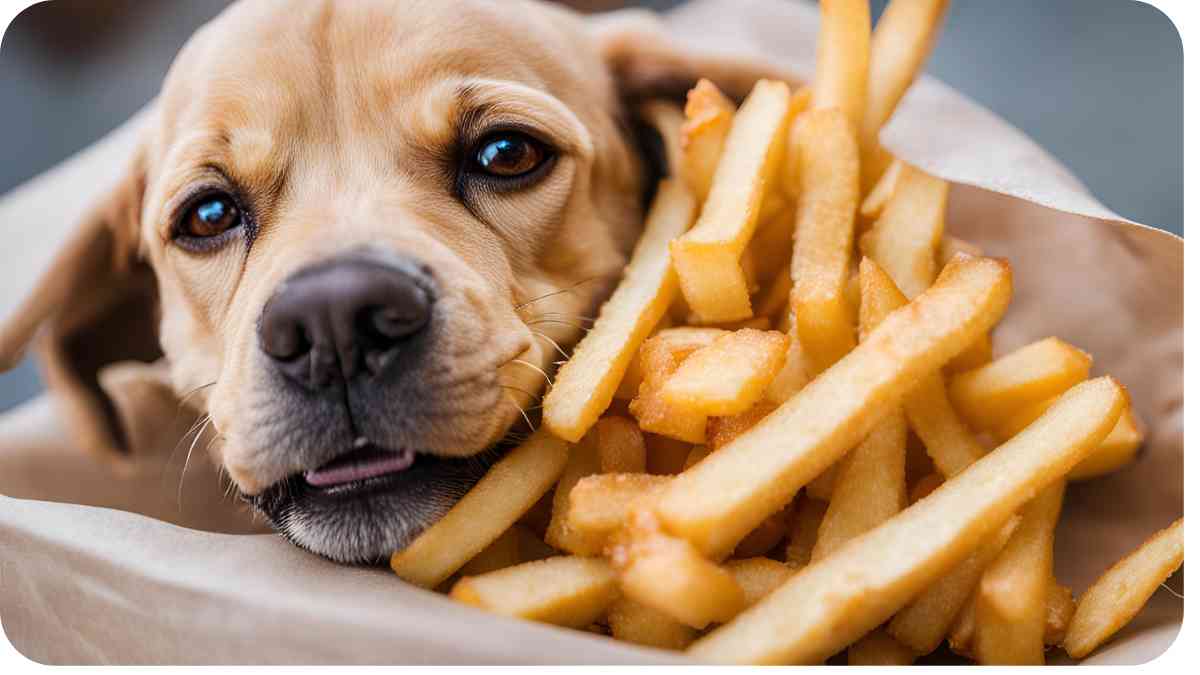When your furry friend looks at you with those big, pleading eyes while you’re munching on some delicious french fries, it’s hard not to share. But before you toss them a fry, you might be wondering: are french fries safe for dogs to eat?
In this comprehensive guide, we’ll explore the potential risks and benefits of feeding french fries to your canine companion and provide some alternative snack options that will keep their tails wagging without compromising their health.
| Takeaways |
|---|
| French fries are not safe for dogs to eat due to their high fat, salt, and unhealthy additives. |
| Feeding French fries to dogs can lead to various health issues such as obesity, pancreatitis, gastrointestinal upset, and sodium ion poisoning. |
| If your dog consumes French fries, monitor them for signs of distress and seek veterinary assistance if necessary. |
| Opt for healthier alternatives to French fries for your dog, such as safe and nutritious dog treats or homemade dog treat recipes made from wholesome ingredients. |
Understanding French Fries

Nutritional Content of French Fries
Before we determine whether french fries are safe for dogs, let’s take a closer look at what they’re made of. French fries are typically high in carbohydrates, fat, and sodium. While these ingredients might make them a tasty treat for humans, they can have adverse effects on a dog’s health.
When considering treats for your furry friend, it’s essential to understand what foods are safe for dogs. French fries, while tempting, may pose risks due to their high fat and salt content, potentially leading to digestive upset or even more severe health issues
Table 1: Nutritional Content of French Fries
| Nutrient | Amount per Serving (100g) |
|---|---|
| Calories | 312 |
| Total Fat | 15g |
| Sodium | 225mg |
| Carbohydrates | 41g |
| Protein | 3g |
Ingredients in French Fries
French fries are usually made from potatoes, which are safe for dogs to eat in moderation. However, the problem lies in how they’re prepared. Most commercial french fries are deep-fried in oil and seasoned with salt and other spices, which can be harmful to dogs.
Table 2: Common Ingredients in French Fries
| Ingredient | Potential Effects on Dogs |
|---|---|
| Salt | Can lead to dehydration and electrolyte imbalances |
| Oil | High-fat content can cause digestive issues and pancreatitis |
| Seasonings | Some spices, like onion and garlic powder, are toxic to dogs |
Can Dogs Eat French Fries?

Risks of Feeding French Fries to Dogs
While a small nibble of french fries might not harm your dog, regular consumption can lead to various health problems. The high salt and fat content in french fries can contribute to obesity, heart disease, and digestive issues in dogs. Additionally, some seasonings used in french fries, such as onion and garlic powder, can be toxic to dogs and should be avoided at all costs.
Curious about what fruits your dog can safely enjoy? Learn whether honeydew melon is a suitable treat for your canine companion. While some fruits are nutritious and safe for dogs, others may cause digestive problems or even toxicity, so it’s crucial to make informed choices.
Table 3: Risks of Feeding French Fries to Dogs
| Risk | Potential Consequences |
|---|---|
| Obesity | Can lead to joint problems, diabetes, and decreased lifespan |
| Digestive Issues | Diarrhea, vomiting, and gastrointestinal discomfort |
| Pancreatitis | Inflammation of the pancreas, a potentially life-threatening condition |
| Sodium Toxicity | Dehydration, increased blood pressure, and kidney damage |
Effects of French Fries on Dogs’ Health
Feeding your dog french fries regularly can have long-term effects on their overall health and well-being. Dogs are omnivores, but their bodies are not designed to handle the high levels of salt, fat, and processed ingredients found in french fries. Over time, these unhealthy snacks can contribute to obesity, diabetes, and other chronic diseases in dogs.
Table 4: Effects of French Fries on Dogs’ Health
| Health Issue | Potential Consequences |
|---|---|
| Obesity | Increased risk of arthritis, heart disease, and cancer |
| Diabetes | Insulin resistance, frequent urination, and lethargy |
| Heart Disease | Hypertension, heart murmurs, and reduced exercise tolerance |
Alternatives to French Fries for Dogs
Healthy Snack Options for Dogs
While french fries may be off the menu for your furry friend, there are plenty of healthy and tasty alternatives that you can offer as snacks.
Table 5: Healthy Snack Options for Dogs
| Snack Option | Benefits |
|---|---|
| Carrot Sticks | Crunchy, low-calorie, and high in fiber |
| Apple Slices | Sweet, hydrating, and packed with vitamins |
| Green Beans | Nutrient-rich, low-calorie, and easy to digest |
| Plain Popcorn | Air-popped without salt or butter for a low-fat treat |
These alternatives provide your dog with essential nutrients and are less likely to cause adverse health effects compared to french fries.
While sharing snacks with your dog can be tempting, it’s important to know whether pretzels are safe for dogs to eat. Despite their crunchy texture and appealing taste, pretzels may contain ingredients like salt or seasonings that could harm your pet’s health if consumed regularly.
Tips for Feeding Your Dog Safely

Creating a Balanced Diet for Your Dog
In addition to offering healthy snacks, it’s essential to provide your dog with a balanced diet that meets their nutritional needs. A well-balanced diet for dogs typically consists of high-quality protein, healthy fats, carbohydrates, vitamins, and minerals. Consult with your veterinarian to determine the best diet plan for your dog based on their age, breed, size, and activity level.
As a dog owner, preserving memories with your beloved pet is priceless. Explore top memory gifts for dog lovers to cherish every moment spent together. From personalized keepsakes to photo albums, these gifts celebrate the special bond between you and your furry companion, creating lasting memories.
Table 6: Components of a Balanced Diet for Dogs
| Nutrient | Role in Dog’s Health |
|---|---|
| Protein | Building and repairing tissues, supporting immune function |
| Fats | Providing energy, promoting healthy skin and coat |
| Carbohydrates | Source of energy and fiber for digestive health |
| Vitamins | Essential for various metabolic processes and overall health |
| Minerals | Important for bone health, muscle function, and electrolyte balance |
Monitoring Your Dog’s Weight and Health
Regular monitoring of your dog’s weight and overall health is crucial for detecting any potential issues early on. Keep track of their body condition score, which assesses their body fat percentage and muscle tone. Avoid overfeeding or indulging them in unhealthy snacks like french fries, as this can lead to weight gain and other health problems.
Preventing and treating heartworms is crucial for your dog’s well-being. Discover effective treatments for heartworms in dogs to safeguard your pet’s health. From preventive medications to treatment options, staying informed about heartworm prevention and management is essential for responsible pet ownership.
Table 7: Signs of a Healthy Dog
| Indicator | Description |
|---|---|
| Healthy Weight | Well-proportioned body with a visible waistline |
| Shiny Coat | Smooth, lustrous fur without bald patches or dryness |
| Clear Eyes | Bright, alert eyes free from discharge or redness |
| Energetic Behavior | Playful and active with no signs of lethargy |
Conclusion
In conclusion, french fries are not safe for dogs to eat due to their high salt, fat, and processed ingredient content. Feeding your dog french fries regularly can lead to obesity, digestive issues, and other health problems.
Instead, opt for healthier snack options like carrot sticks, apple slices, green beans, or plain popcorn. Remember to provide your dog with a balanced diet and monitor their weight and overall health regularly. By prioritizing your dog’s health and well-being, you can ensure that they live a long, happy, and healthy life.
Further Reading
- ManyPets: Can My Pet Eat French Fries?
- ManyPets provides comprehensive information on pet food safety, including whether pets can safely consume French fries. Explore their article to learn more about the potential risks and considerations.
- PetMD: Can Dogs Eat French Fries?
- PetMD offers expert insights into canine nutrition, including discussions on whether dogs can eat French fries. Dive into their article to discover the potential health implications and alternatives.
- MasterClass: Can Dogs Eat French Fries?
- MasterClass explores the topic of dogs consuming French fries, providing insights into the nutritional aspects and potential risks involved. Check out their article for valuable information on keeping your dog safe and healthy.
FAQs
Are French fries safe for dogs to eat?
French fries are not safe for dogs to eat due to their high fat, salt, and unhealthy additives, which can lead to various health issues.
What are the potential health risks of feeding French fries to dogs?
Feeding French fries to dogs can contribute to obesity, pancreatitis, gastrointestinal upset, and sodium ion poisoning.
How can I tell if my dog is experiencing distress after eating French fries?
Signs of distress in dogs after eating French fries may include vomiting, diarrhea, lethargy, abdominal pain, or excessive thirst.
What should I do if my dog eats French fries?
If your dog eats French fries, monitor them for signs of distress and seek veterinary assistance if necessary, especially if they consume a large amount or exhibit concerning symptoms.
What are some healthier alternatives to French fries for dogs?
Healthier alternatives to French fries for dogs include safe and nutritious dog treats specifically formulated for canine consumption, as well as homemade dog treat recipes using wholesome ingredients like pumpkin, sweet potatoes, carrots, and lean meats.

I am Dr Hellen James a veterinarian, pet lover, and writer. I have many years of experience caring for pets, including dogs, cats, birds, and fish (and even axolotls!). I love spending time with the animals in my life, especially when they are sick or need love.

